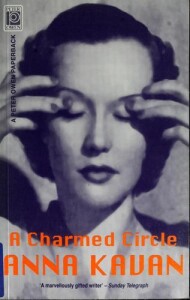
I’ve long been a fan of Kavan’s work, ever since a copy of her second novel leapt off the shelves and into my hands due to its title: Let Me Alone.
At last! I thought. Someone who speaks my language.
This, her first novel, published in 1929, is the story of an English family whose life has become so enclosed as to become toxic. A modern town, loud with trams and lorries and motorcycles, has grown up around their walled home, an old vicarage. What is a refuge for the parents—Dr. Deane who has ceased to practice and spends his days among his books and autocratic Mrs. Deane whose only friends are two elderly sisters who live outside of town—has become a prison for the three children, who are now young adults.
At the beginning of the story, Ronald, the spoiled, feckless son, has gone off to London to work and is much envied by the lively, independent Beryl, while her older sister Olive has become a melancholy mouse. Beryl no sooner decides to ask her brother to help her escape to London than she finds he’s returning home, bored with having to earn a living.
At the same time, two young men enter the family’s closed sphere: a sculptor whom Ronald met in London comes for a weekend and the nephew of the two elderly sisters who has come to the area to take up farming. Between them, they offer opportunities for the sisters and raise the stakes for any potential escape.
It is the language in this psychological novel that intrigues me: precise, cool, and brusque. Kavan’s Spartan prose style contrasts with the stuffy, ornate atmosphere of the vicarage, thus increasing the tension around the family. It also sets the reader up for the different sort of life Beryl might discover in London.
Slipping out of the grasp of a controlling parent is a theme that always interests me. The post-war period of the 1920s, like the 1960s, was a time when women were doing the same with society’s expectations for them. As they try to assert their independence, both Beryl and Olive continue to surprise throughout this story.
Their father insists that they—and the rest of the family—will always fail, saying:
There is some defect in us all, some flaw, some canker of the soul that holds us back from fruition. Life is too hard for us. We yearn and struggle and rebel, but in the end we are always vanquished because of that obscure disability. We cannot succeed because we are not free. Some inhibition, some fatal limitation, binds us, from which we can never escape.
Kavan’s prose is unusual in that it is forthright in this way. She plumbs the motives of the characters, their feelings and unspoken words and then tells us straight out. Using an omniscient point of view, she inhabits the characters in turn, giving the reader a full picture of their psychological states and the reasons for their actions.
While I usually prefer a single point of view and more subtlety in fiction, I found this story refreshing. I also felt confident that I was in good hands with this author and surprised by her skill in this first novel. In her later novels, Kavan moves from this realism to a more experimental style.
If you’re looking for something a little different, I recommend this book. Its breezy style and brief chapters make it almost fly by. And it’s hard not to care about these characters as they try to assert the freedom to be themselves.
Do you enjoy a novel more when you identify with one of the characters?